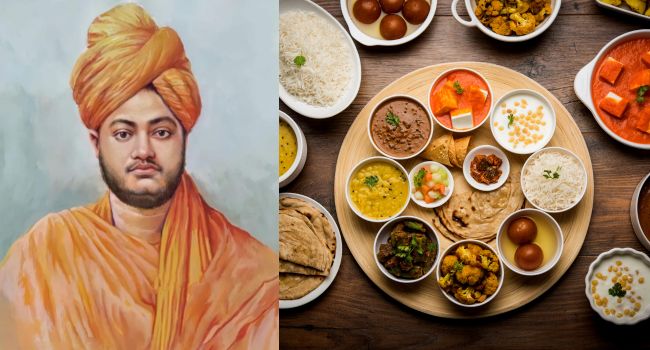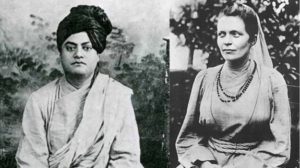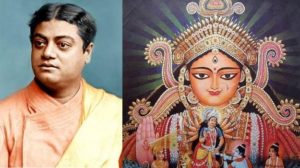This article has been authored by Durga Prasad, an ardent devotee of Swami Vivekananda.

Why did Swami Vivekananda teach us to be non-vegetarian? Because of a context. Swami Vivekananda’s stance on non-vegetarianism must be viewed in the light of the specific context in which he lived. During the times of Swami Vivekananda (19th century), the situation of the Indian masses was marked by various challenges and difficulties.
India was under British colonial rule, which had a significant impact on the social, economic, and political conditions of the country. It was the time when our country, India, was grappling with issues such as poverty, malnutrition, and food shortages, particularly among the economically disadvantaged sections of society.
People faced numerous hardships; malnutrition and lack of access to proper healthcare were prevalent issues, leading to a general state of physical weakness and low vitality among many people.
Besides, the British colonial era in India was marked by a series of devastating famines that resulted in significant loss of life and immense suffering among the Indian population. These famines were characterized by acute food shortages, widespread starvation, and inadequate relief efforts, leading to excessively high mortality rates.

The Bengal famine of 1770, the Chalisa famine (1783–1784), the Doji bara famine (1791–1792), and others, were some of the most devastating events in Indian history. Millions of people lost their lives due to starvation and related diseases during these periods of acute food scarcity.
The Great Famine of 1876–1878 was one of the most severe famines in the 19th century, and it affected many regions of India. The Indian famine of 1896–1897 and the Indian famine of 1899–1900 also caused widespread suffering and loss of life. (Ref: Timeline of major famines in India during British rule – Wikipedia)

Swamiji had traveled throughout the length and breadth of the country, and he observed that the masses of India often wore looks of sadness on their faces, lacked courage and enthusiasm, and appeared weak with little strength in their bodies. He felt that the people of the country needed to be physically stronger and healthier to face the challenges they were encountering.
In such circumstances, he clearly saw the practical problems and challenges of advocating strict vegetarianism in his teachings. Swamiji acknowledged the value of “Non-violence is the highest virtue,” but he also emphasized the importance of considering the capacity and adaptability of people before attempting to enforce such principles through legislation.
He pointed out that blindly imposing such ideals without understanding the circumstances has resulted in adverse consequences. For instance, a poor man, who has to struggle hard for his and his family’s existence, may have ahimsa (non-violence) as the ultimate goal, but cannot accept it as the immediate means.
Likewise, a nation, constantly threatened by external enemies, cannot resort to unconditional ahimsa. Ahimsa would make a weak person weaker, for ahimsa and forgiveness glorify only the strong and the brave.
His advice to eat fish and meat was not an absolute endorsement of non-vegetarianism, but rather a practical approach considering the prevailing conditions. He felt that a diet including animal proteins would help improve the physical strength and energy levels of the people, which was crucial for their overall well-being.

He highlighted that the Vedas and the laws of Manu contain injunctions both for taking fish and meat as well as for abstaining from killing. He emphasized that the appropriate choice between these practices should be based on individual capacity, fitness and adaptability.
Vegetarianism might be a noble choice for those belonging to the elite or the upper class (representing the top ten percent of the population in terms of social and economic status) who do not have to engage in manual labor to earn their livelihood; but, it cannot be imposed upon the economically disadvantaged sections of society who have to labor day and night to make ends meet.
Swamiji also sought to instill a militant spirit among the Indian people. Through advocating meat-eating, he aimed to promote physical strength and vitality throughout the country. In his view, a well-nourished and robust population would be better equipped to resist foreign rule and take the necessary action to regain their freedom.
“Do you think that a handful of Englishmen could rule India if we had a militant spirit? I teach meat-eating throughout the length and breadth of India in the hope that we can build a militant spirit!”
– Swami Vivekananda, Complete Works, Volume 9
Thus, the ethical principles should be applied with discernment and compassion, considering the broader context and the well-being of individuals and society as a whole. This was also the idea behind the yajña. (Ref: Manusmriti Verse 5.39)
Swamiji also criticized the practice of religious hypocrisy, where people appeared to follow certain principles but lacked sincerity in their actions.
He said,
I have come across many a “religious heron” in India, who fed ants with sugar, and at the same time would not hesitate to bring ruin on his own brother for the sake of “filthy lucre”!
– Swami Vivekananda, Complete Works, Volume 5
In the story, the heron pretends to be religious and non-violent, feigning to have forsaken its old habit of catching fish. However, it deceives the fish by pretending to meditate, all the while secretly planning to seize any unwary fish that comes close.
The heron represents the religious hypocrites—individuals who adopt a selective or hypocritical approach to spirituality and moral conduct. They outwardly claim to follow high moral ideals but fail to consistently apply the same principles in their everyday actions or interactions with others.
It is relatively easy to understand and put into practice the grosser, physical aspect of any spiritual value. Moreover, it gains obvious recognition from the people around us. However, conquering envy, anger, and hatred—the subtler levels of himsa or violence—is extremely difficult. Hence, ahimsa in course of time gets reduced to vegetarianism, its subtler aspect being totally forgotten.
Swamiji encouraged his disciples to follow the path of selfless service and non-attachment to material desires, which would eventually lead to a natural inclination towards a vegetarian diet, through the development of Sattva.
All liking for fish and meat disappears when pure Sattva is highly developed, and these are the signs of its manifestation in a soul: sacrifice of everything for others, perfect non-attachment to lust and wealth, want of pride and egotism. The desire for animal food goes when these things are seen in a man.
And where such indications are absent, and yet you find men siding with the non-killing party, know it for a certainty that herein, there is either hypocrisy or a show of religion. When you yourself come to that stage of pure Sattva, give up fish and meat, by all means.
– Swami Vivekananda, Complete Works, Volume 5

Swami Vivekananda himself understood and appreciated the ideal of vegetarianism as a purer and more compassionate dietary choice. However, he also recognizes that in certain situations and circumstances, adhering strictly to the ideal might be challenging or even infeasible.
Nevertheless, he encourages individuals not to compromise their values entirely but to be mindful of their ethical principles and strive to align their actions with those principles whenever feasible. He had also envisioned a shift towards vegetarianism, with the advance of science.
“The meat-eating animal, like the lion, gives one blow and subsides, but the patient bullock goes on all day, eating and sleeping as it walks. The “live Yankee” cannot compete with the rice-eating Chinese coolie. While military power dominates, meat-eating still prevail; but with the advance of science, fighting will grow less, and then the vegetarians will come in.”
– Swami Vivekananda, Complete Works, Volume 7
Uplift your consciousness! Receive daily spiritual quotes from great Rishis. Subscribe to the Spiritual Bee’s broadcast on WhatsApp.









